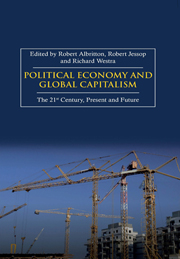Book contents
- Frontmatter
- Contents
- List of Abbreviations
- Notes on Contributors
- Introduction: Political Economy and Global Capitalism
- Part 1 Political Economy of the Present
- Introduction
- 1 Theorizing the Contemporary World: Robert Brenner, Giovanni Arrighi, David Harvey
- 2 Technological Dynamism and the Normative Justification of Global Capitalism
- 3 Eating the Future: Capitalism Out of Joint
- 4 What follows Neo-liberalism? The Deepening Contradictions of US Domination and the Struggle for a New Global Order
- 5 Monetary Policy in the Neo-liberal Transition: A Political Economy Critique of Keynesianism, Monetarism and Inflation Targeting
- Part 2 Political Economy of a Progressive Global Future
- Index
2 - Technological Dynamism and the Normative Justification of Global Capitalism
from Part 1 - Political Economy of the Present
Published online by Cambridge University Press: 05 March 2012
- Frontmatter
- Contents
- List of Abbreviations
- Notes on Contributors
- Introduction: Political Economy and Global Capitalism
- Part 1 Political Economy of the Present
- Introduction
- 1 Theorizing the Contemporary World: Robert Brenner, Giovanni Arrighi, David Harvey
- 2 Technological Dynamism and the Normative Justification of Global Capitalism
- 3 Eating the Future: Capitalism Out of Joint
- 4 What follows Neo-liberalism? The Deepening Contradictions of US Domination and the Struggle for a New Global Order
- 5 Monetary Policy in the Neo-liberal Transition: A Political Economy Critique of Keynesianism, Monetarism and Inflation Targeting
- Part 2 Political Economy of a Progressive Global Future
- Index
Summary
It is certainly possible to overestimate the practical importance of arguments for the normative legitimacy of global capitalism. But normative arguments continue to circulate in the social world, and it would be foolish to think that they do so without significant social effects. As long as ideological defences of capitalism continue to be produced, there will be a need for ideology critiques.
Arguments – for the normative legitimacy of global capitalism – unfold in three main stages. A normative principle (or set of principles) must be proposed and defended. Then, it must be established that a global capitalist order is compatible with, or even necessary for, the adequate institutionalization of that principle. If the global economy is at present flawed from the standpoint of the given principle, this must be shown to be a contingent matter, capable of being reversed through appropriate reforms.
In the first section I shall present what I take to be the strongest contemporary version of this argument, combining the normative principle articulated by the leading contemporary theorists of global justice with the most significant recent development in mainstream economics – ‘new growth theory’. In the second section, I shall present a critical assessment of this position from a Marxian standpoint. In the third section it will be shown that the position is internally incoherent. The paper concludes with a speculation regarding the future course of global capitalism.
- Type
- Chapter
- Information
- Political Economy and Global CapitalismThe 21st Century, Present and Future, pp. 25 - 42Publisher: Anthem PressPrint publication year: 2007
- 1
- Cited by

